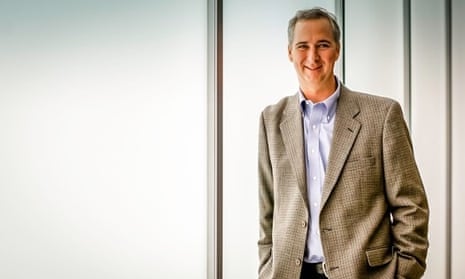Which would you say is most useful to an entrepreneur; perseverance, the letters MBA on your CV header, or attention deficit hyperactivity disorder (ADHD)? Serial entrepreneur and business coach Cameron Herold might punt for the last. In his popular 2010 TED talk – “Let’s raise kids to be entrepreneurs” – Herold argued that behavioural traits associated with the disorder, such as a tendency to see the whole picture rather than remember detail, should be encouraged and developed by schools, because they are key entrepreneurial qualities. “Attention deficit [hyperactivity] disorder can be a problem, or it can be an opportunity,” he told us.
The Canadian, who has ADHD, launched his first business aged 21 and has since grown three companies past the $100m mark. He was previously vice president of Ubarter.com (a B2B bartering services company), chief operating officer of 1-800-GOT-JUNK? and is now chief operating officer of coaching company BackPocket. He opened his TED talk with the line: “I would be willing to bet that I’m the dumbest guy in the room because I couldn’t get through school” and describes how he struggled in the classroom.
However, he is an example of why those with the condition can go on to become highly successful entrepreneurs. “We [children with ADHD] couldn’t memorise the whole text book, we couldn’t remember everything the teacher was teaching us,” he told the Small Business Network. “So we had to figure out the shortcuts and we went in for extra help from the teacher. As entrepreneurial CEOs [those children] will look for those shortcuts, they’ll recognise that there’s an easier path.
“Our [ADHD] allows us to see everything around us – to see the customer, the market, the economy and the supplier - without becoming hyper-focused on the details.”
Herold is now a seasoned speaker and lecturer, including on the Entrepreneurial Organization/MIT Massachusetts Institute of Technology masters programme. While public speaking is a fear for many, Herold says he thrives on the experience, which he attributes in part to his ADHD. “I get a lot of energy from transferring my ideas to a group,” he says. “The flipside is that I’m terrified of cocktail parties. I really don’t like going to small group events where I have to mingle. I find them really, really stressful.”
Attention hyperactivity deficit disorder is a condition characterised by behavioural problems including inattentiveness, hyperactivity and impulsiveness. However, some people with the condition only experience inattentiveness and some only experience hyperactivity and impulsiveness.
Herold coaches CEOs, many who display the symptoms of ADHD. He refers to them as “entrepreneurial type” CEOs and believes they have an edge over the more scholastic, MBA-educated group of business leaders. “I think [entrepreneurial CEOs] see through the clutter a little bit, it could be the [ADHD]. We recognise that in [business] systems that seem complex and confusing there has to be an easier way.” In contrast, he says, MBA graduates “over process, over think, over analyse and over strategise”.
Herold is passionate about the importance of encouraging pupils with entrepreneurial traits, having felt “different and outcast” in school. He would like schools to tailor their teaching to suit the varied learning styles of children, and move away from the traditional model that is most suited to academic pupils.
To some extent, this is starting to happen, he says. Schools and parents are taking an interest in entrepreneurship in the classroom. He also believes parents’ attitude to ADHD is changing. “They understand it’s important to stop the [extent] of diagnosis and medication of children [who are seen] as having a problem when often there’s nothing wrong with the child at all – it’s just that they don’t like their teachers or they don’t fit the system.”
A shift in attitudes towards entrepreneurs has happened over the last 15 years, he says, particularly since running or working for an internet company has become “cool”. “Prior to that [as an entrepreneur] you were capitalist, you were profit-centric and you were greedy. But, by around the year 2000, becoming an entrepreneur was ok.”
Among the entrepreneurs Herold mentors is a 16-year-old boy who has established a successful business. “He’s decided that a university education isn’t a path that he wants to go down. He wants to continue to build his little business.” Herold coaches the young business owner on Skype and when his parents come on a call Herold says he can sense their excitement about their son’s achievements.
What would be his advice for budding entrepreneurs? “I would like to see them recognising the value of an apprenticeship or internship programme. I’d tell them to find four amazing, fun organisations in their city and say to those organisations: ‘I’d really like to work for you and I’ll do it for free, or for minimum wage, for three months’.”
He suggests one of the conditions of the agreement should be that the intern can sit in on board meetings and really get a feel for the startup world. “You’ll find these entrepreneurial companies of 50 to 100 people are really willing to do that. And that type of learning is much cheaper than going to university or college and it’s going to give you exposure to entrepreneurial companies.”
Herold says he still gets positive feedback on his TED talk. “I get notes from parents and kids [who are struggling in school] on a daily basis who say ‘thank you, this has changed me’; ‘thank you, I realise there is nothing wrong with me now’.”
Sign up to become a member of the Guardian Small Business Network here for more advice, insight and best practice direct to your inbox.

Comments (…)
Sign in or create your Guardian account to join the discussion